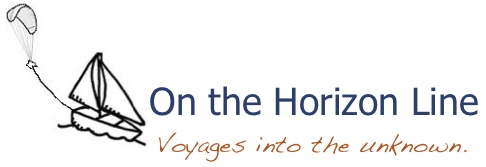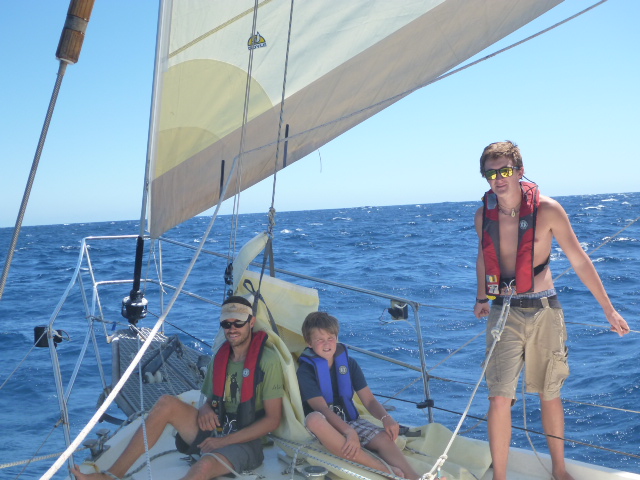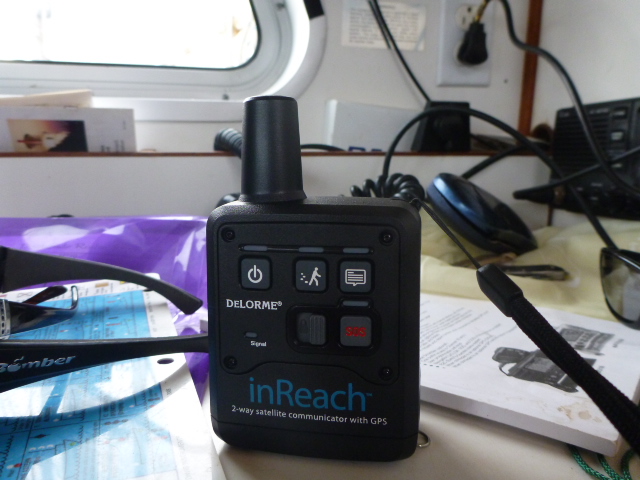The Pain of Passage-Making
Many people envision sailing as a romantic and relaxing hobby. I still do, too, even knowing from experience that the romance and relaxation account for about 10% of the actual time on a sailboat. It’s easier — and more fun — to talk about the sunsets and stars, or even the more dramatic storms or near-disasters, than the daily routine of sailing across the ocean. But no one really mentions the parts of passage-making that slowly drive you insane. Or that there will be at least one morning when you’ll close your eyes tight against the new day, hoping to make it tomorrow already so that you don’t have to deal with the constant motion and maintenance of a floating home a thousand miles from anywhere.
No one talks about the frustration of flapping sails that grate like fingers on a chalkboard. About the persistent sideways swells that keep you gyrating like a drunk pendulum and make your brain feel like it’s on a merry-go-round with no way to get off. About the fact you’ll scream at the dishes to “just fucking stop it!” the 1,024th time they rattle, roll and crash to the floor. About the fact that you’ll need to change sails at midnight on a wildly swinging deck in the rain because no one can sleep with the boom banging in the light winds. About the rash on your butt from sitting so damn much.
No one told me that if my husband was seasick much of the first half, I’d have double-duty cooking and cleaning. Or about the fact that there are endless amounts of dishes on a boat with 7 crew members. Or about how dizzy you’ll get watching the gimbaled stove rock as you attempt to make a meal for those 7 people with the dishes flying every which way and bottles clanging out onto your head when you open cabinets.
It’s hard work, this sailing across the planet business. Tiring, monotonous, frustrating work. Luckily, Rob and I were under no illusions this crossing would be anything less. We came aboard knowing we’d have to take one day at a time.
Of course, to be fair, there are dozens of small miracles cruisers’ forums and sailing books forgot to mention, too, interspersed blessings that take the edge off. Like how the sound of your bow wave can calm those grated nerves. Or how standing on the foredeck will make you laugh aloud as you surf up, up, up and down the endless swells. And how luxurious it can feel to have the time and space to think — or not to think — as you stare aimlessly across the miles as they roll by.
We learned that it’s little things that are the most challenging to overcome, like dishes and rashes and moldy sheets. But we also learned that it’s the little things that keep you from going insane. The well-timed joke from a crew member that makes you giggle instead of scream. The flying fish and swirling storm petrels that come by to say hi. The thoughtful husband that brings you a pillow for your sore butt while you sit gazing from the bow. The game of Scrabble or the book that sucks you in and holds the world at bay.
The way I see it, a long crossing might be akin to what I’ve heard about childbirth: the pain pales when you hold the fruit of your labor. The daily frustrations of sailing evaporate when the dolphins appear or when you see the turquoise waters approaching land. The pain of passage-making will eventually fade in comparison to the romantic memories, even if they do only account for 10% of the voyage. And I’ll probably be another one of those people who forget to mention the flapping sails and rattling dishes.
Post-Script from Later in the Passage:
Day 29 of the passage. After a stellar post-fresh-produce dinner of chiptle chicken enchiladas with roasted red peppers, we were all sitting in the cockpit digesting and watching the full moon on the water. Gavin decided to start a sharing game. His brothers tried to joke it off, but he was adamant that everyone answer the question: “Why are you here, now, on this boat?” These answers are almost verbatim.
Gavin (10): “Because the ocean is fun and exciting. And you never know what might happen. I thought today would be the same as yesterday, but then that Japanese fishing boat passed 100 feet off our bow this morning and I made a horn from a conch shell.”
Bri (32): “Because I have no choice today to be anywhere else. A big part of why we chose this boat, though, is because of you, Gavin. We wanted to be with people of all ages, including kids, during the first part of our ocean adventure.”
Connor (18): “Because of a whole host of preconceptions and misconceptions, both correct and incorrect.”
Rob (37): “Because Bri told me she’s always wanted to cross the Pacific, and I let myself be convinced it’d be a good idea.”
Rowan (15): “Because there’s nowhere else to go. And it’s a good opportunity to explore. Plus, it makes me appreciate the things I like best about home and school.”
Brooks (53): “This is the type of adventuring I’ve done most of my life, in a different format. We chose this boat and this course as a means of addressing the tactical and technical aspects of climate change impacts on the planet. We’re expensing everything to make this trip: economically, emotionally, physically. And we’re hoping it becomes a way to pursue our passions while supporting us economically.”
Janis (49): “Because Connor went to Maine one summer and took a bunch of sailing classes. Next thing I knew, we bought this boat and here we are.”








